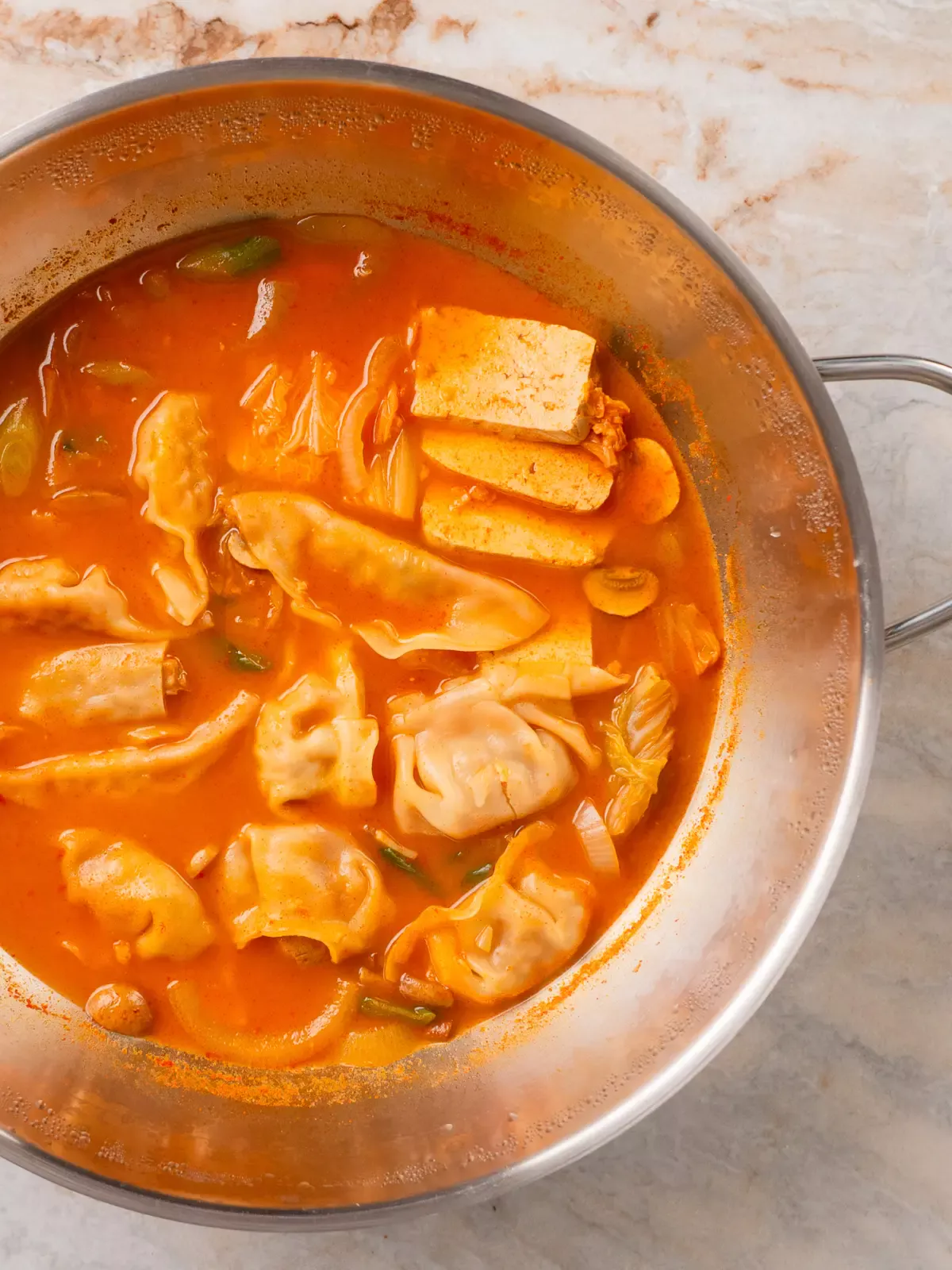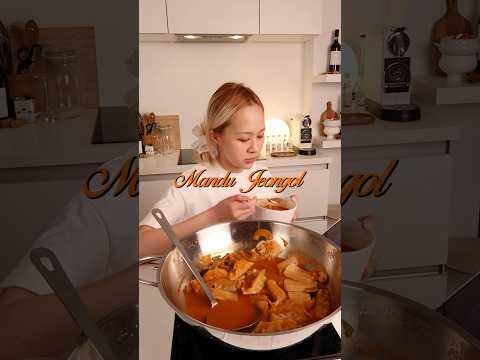Today I’m going to show you how to make a spicy Korean hot pot with dumplings in less than 20 minutes.
This dish is called Mandu Jeongol (만두 전골) in Korea, and it’s a popular home-cooked meal that’s not only easy to make, but also packed with vegetables. It’s one of those comforting dishes that Korean families often enjoy together.
Table of Contents
What is Mandu Jeongol?
Mandu Jeongol is a Korean hot pot dish made by simmering dumplings (mandu) with vegetables such as napa cabbage, mushrooms, and tofu in a flavorful broth. Optional ingredients such as thinly sliced beef or seafood such as clams can be added to deepen the flavor. It’s usually made spicy with gochujang (Korean chili paste) or gochugaru (Korean chili flakes), but it can also be made in a mild version without the heat.
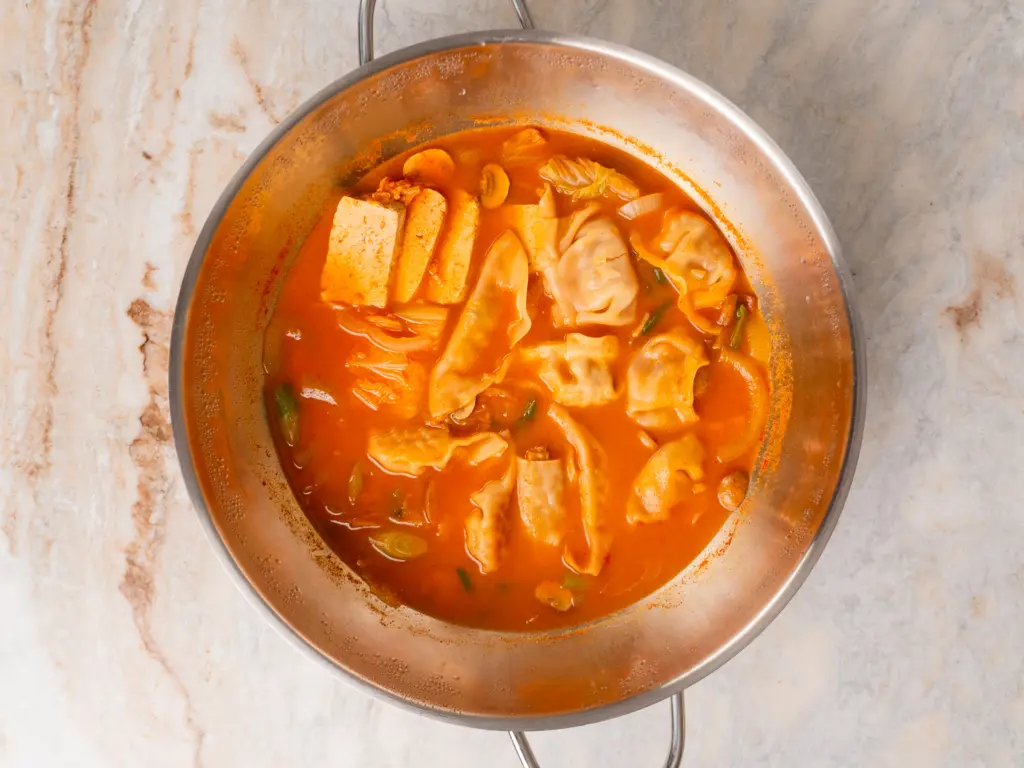
What is Jeongol (Korean Hot Pot)?
Jeongol is a classic Korean hot pot dish that is perfect for sharing at the table. What makes it special is that everything – meat, seafood, tofu, mushrooms, and a variety of vegetables – is neatly arranged in a shallow pot and simmered in a flavorful broth right at the table. It’s a cozy and communal way to eat that brings people together, especially in colder seasons when the bubbling pot also helps warm the room.
Korean Hot Pot(Jeongol) Menu
- Beef Bulgogi Jeongol: A bulgogi hot pot where sliced beef is cooked with vegetables such as Napa cabbage, mushrooms and onions in a rich broth. It’s a hearty and delicious dish that’s perfect for a filling meal. Below is another variation called ttukbaegi bulgogi, which is cooked in a hot stone pot and doesn’t require marinating, making it a quick and easy traditional Korean beef dish.
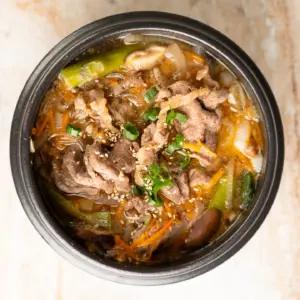
- Shabu-shabu: A thinly sliced beef stew in which the beef is quickly dipped into broth and eaten while still tender. It’s usually cooked in a clear broth, but sometimes it can be made spicy.
- Mushroom Jeongol: This hot pot includes various types of mushrooms like enoki, king oyster, shiitake, and oyster mushrooms. It’s cooked in broth with thinly sliced beef for a savory and earthy flavor.
- Gopchang Jeongol: It may come as a surprise to non-Koreans, but gopchang jeongol is one of the most popular hot pot dishes in Korea. It’s made with beef intestines, mushrooms, napa cabbage, and spicy broth. To balance the strong smell of the intestines, aromatic herbs such as ssukgat (crown daisy) or perilla leaves are often added.
The Difference Between Jjigae and Jeongol?
Jjigae is usually made by simmering ingredients such as vegetables, meat, or kimchi in a pot of broth on the stove. The below recipe is Sundubu Jjigae with beef.
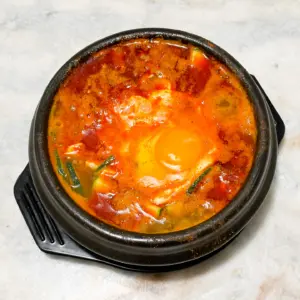
Jeongol, on the other hand, is made by arranging all the ingredients neatly in a wide, shallow pot, adding broth, and cooking the dish at the table while eating.
Jeongol Pot
There are different types of jeongol in Korea, so every household has its own jeongol pot. A jeongol pot should be of medium depth – neither too shallow nor too deep – and wide enough to hold all the ingredients. It’s also important to have a pot with a lid. Below is the jeongol pot (wok) I use every time I make jeongol.
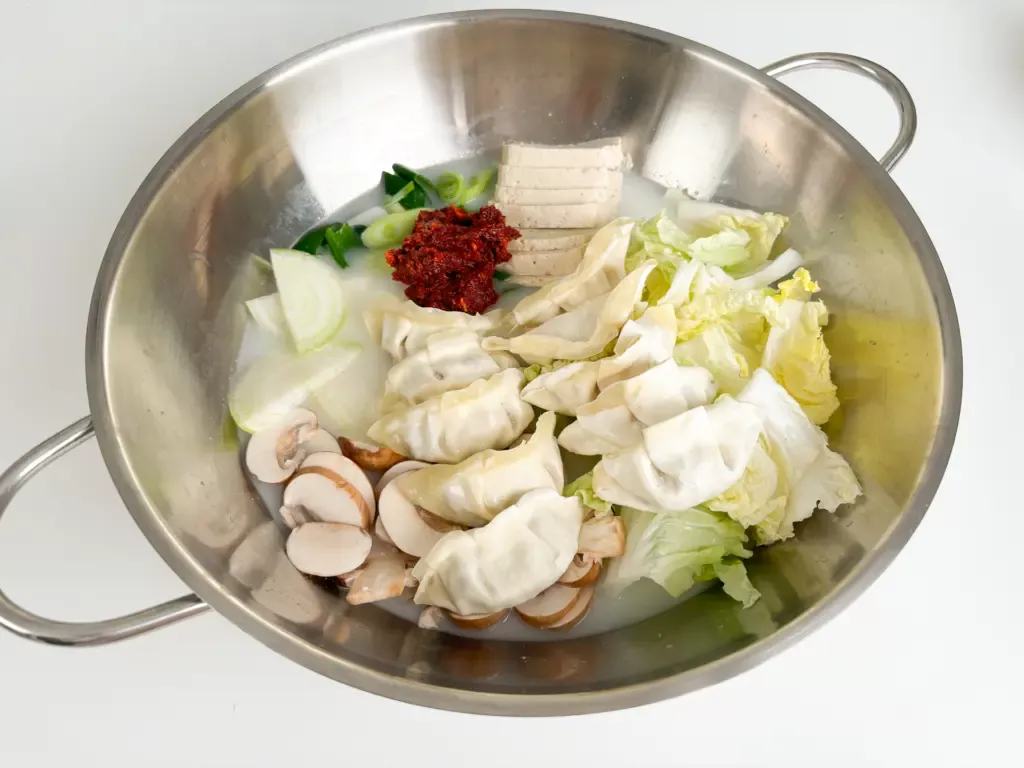
- Jeongol Pot: For steaming or simmering, you’ll need a wide and deep wok.
- https://amzn.to/3DQgIPu (US), https://amzn.to/4hmr6w3 (DE), https://amzn.to/42f3uVG (NL), https://amzn.to/3RcZnmR (UK)
You can also use this jeongol steamer for steamed dishes. It’s perfect for making Korean-style steamed fish or steamed vegetable dishes like the one below. That’s why a jeongol pot is truly essential to Korean cooking – it’s versatile and can be used for so many types of dishes!
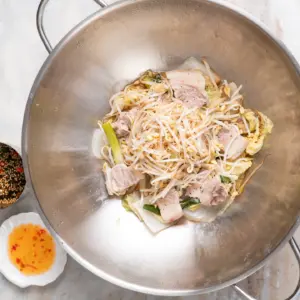
How to Keep Dumplings from Falling Apart?
Frozen dumpling holds the shape better than fresh ones when cooked, so I recommend using frozen dumpling for soup or hot pot. If you only have fresh mandoo, you can freeze them before using. That’s why many Korean mothers either freeze homemade mandoo or use store-bought frozen mandoo when making dishes like soup or jeongol.
No Gas Burner at Home?
Don’t worry. It’s no big deal if you don’t cook the jeongol at the table. You can still cook it in the kitchen and then bring the jeongol pot to the table. It will still be just as delicious!
Korean Hot Pot with Dumplings Ingredients
- Frozen Dumplings: You don’t need to make mandu from scratch — frozen mandu work just fine. I personally recommend Bibigo dumplings from Korea!
- Bibigo dumpling: https://amzn.to/3EcgWAx (US), https://amzn.to/3R9GvFh (DE)
- Beef Bone Broth: Alternatives to beef bone broth will be listed in the substitutions section below.
- Vegetables: Any mushroom can be used. Shiitake and enoki mushrooms are commonly used in Korea, but I used brown mushrooms because they are easier to find in Europe. Napa cabbage adds a refreshing flavor to the broth.
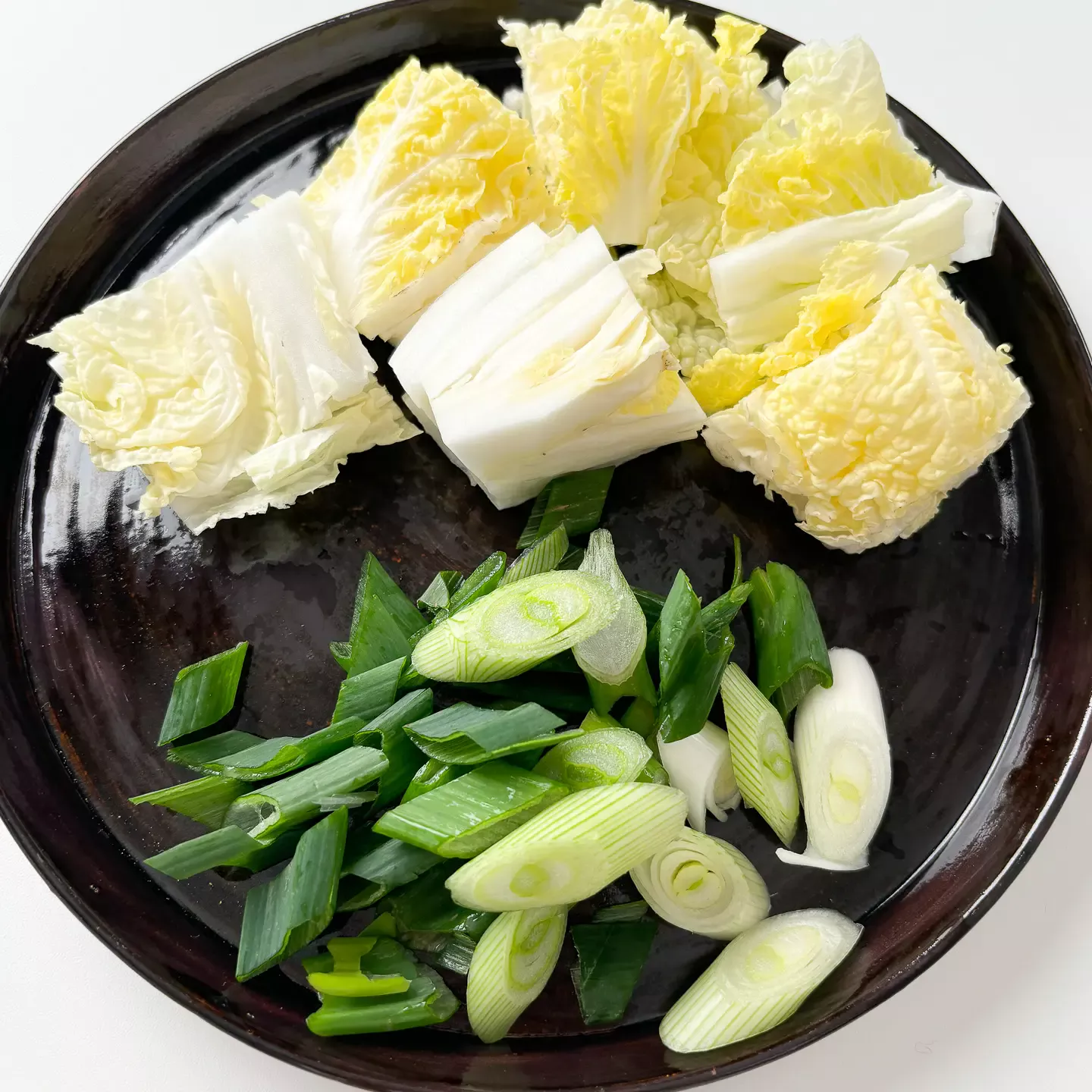
Optional Add-ins
- Meat or Seafood: I haven’t included meat or seafood here, but you can add them for a richer, more flavorful broth and to make the hot pot even more protein-packed.
- Tteok (Rice Cake): Koreans often add rice cakes (tteokguk tteok) to jeongol. The rice cakes thicken the broth and add a chewy texture to the tender ingredients.
- sliced rice cake: https://amzn.to/4jqexRQ (US), https://amzn.to/4lkHf8e (DE), https://amzn.to/4ljMPbb (UK)
- Noodles: Koreans love to add noodles to their jeongol. Common choices are ramen, udon, dangmyeon (sweet potato noodles), or kalguksu (knife-cut noodles). For mandu jeongol, dangmyeon or kalguksu noodles are typically added.
- Dangmyeon: https://amzn.to/43FMDN0 (US), https://amzn.to/4irle5j (UK), https://amzn.to/3Emdt2g (DE), https://amzn.to/3Rc6Mmm (NL, BE)
Great Side Dishes to Pair with
- Rice: Mandu Jeongol is usually eaten with rice. You can eat the dumplings and vegetables as a side dish with rice, mix the rice into the soup, or eat them separately with the broth.
- Kimchi: Kimchi is the perfect side dish for any Korean meal, and it pairs beautifully with mandu jeongol.
Ingredient Substitutes
- Beef Bone Broth Substitute: If it’s difficult to find beef bone broth abroad, you can make a flavorful broth by removing the skins from two dumplings and mashing the filling. The dumpling filling will naturally make a rich broth. You can also add beef or chicken stock to enhance the flavor. If you prefer, you can use seafood to make the broth or add seafood stock for a different flavor profile.
- Tuna Fish Sauce: Tuna sauce can be substituted with other fish sauces. If you use Korean anchovy sauce, it’s saltier than tuna sauce, so I recommend using it in smaller amounts. If you use Southeast Asian fish sauce, it’s less salty than Korean anchovy fish sauce, so adjust the seasoning to taste.
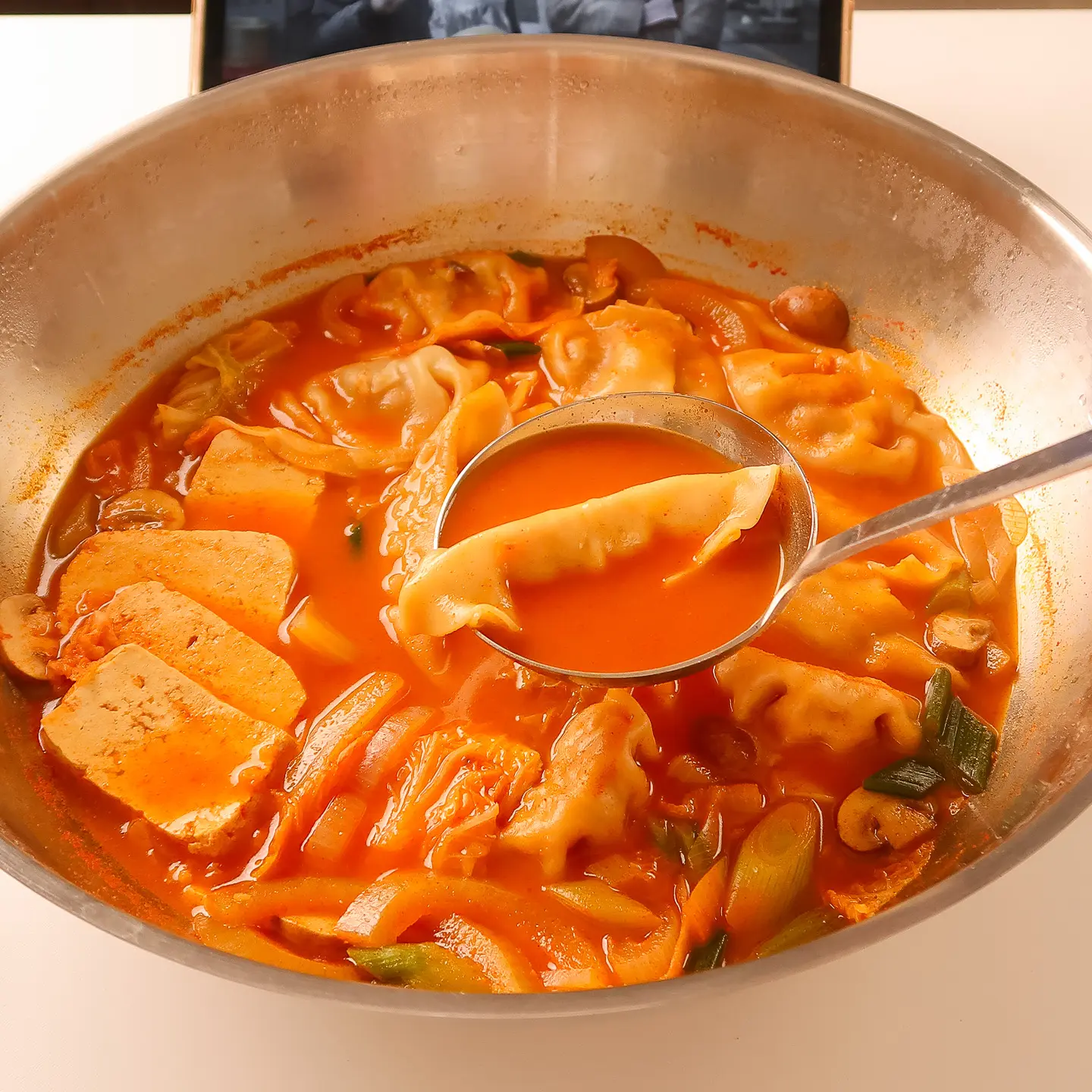
Vegan Options
- Vegan Dumplings: If you’re vegan, you can substitute vegan dumplings for the regular dumplings. I used this time was a vegan Korean BBQ dumpling, and I almost forgot it was vegan because it was so delicious!
- Vegan Dumpling: https://amzn.to/4i6xh7y (US), https://amzn.to/4ie6577 (UK), https://amzn.to/3Yr0vaj (DE)
- Vegetable Broth: Instead of beef bone broth, you can make a vegetable broth by boiling vegetables or using vegetable stock.
- Skip Fish Sauce: You can skip the fish sauce altogether, but keep in mind that the umami flavor will be reduced. You can adjust the seasoning with salt or soy sauce, but the depth of flavor from the fish sauce can’t be fully replicated.
Korean Hot Pot Fried Rice
If you have leftovers from your hot pot, you’re in luck! You can make a delicious K dessert. Just leave a little broth in the pot and cut the remaining ingredients into small pieces with scissors. Add the rice to the pot and stir-fry with a little oil. Finally, add some sesame oil and sprinkle with seaweed flakes. And voila, you’ve got Korean-style fried rice made from hot pot leftovers!
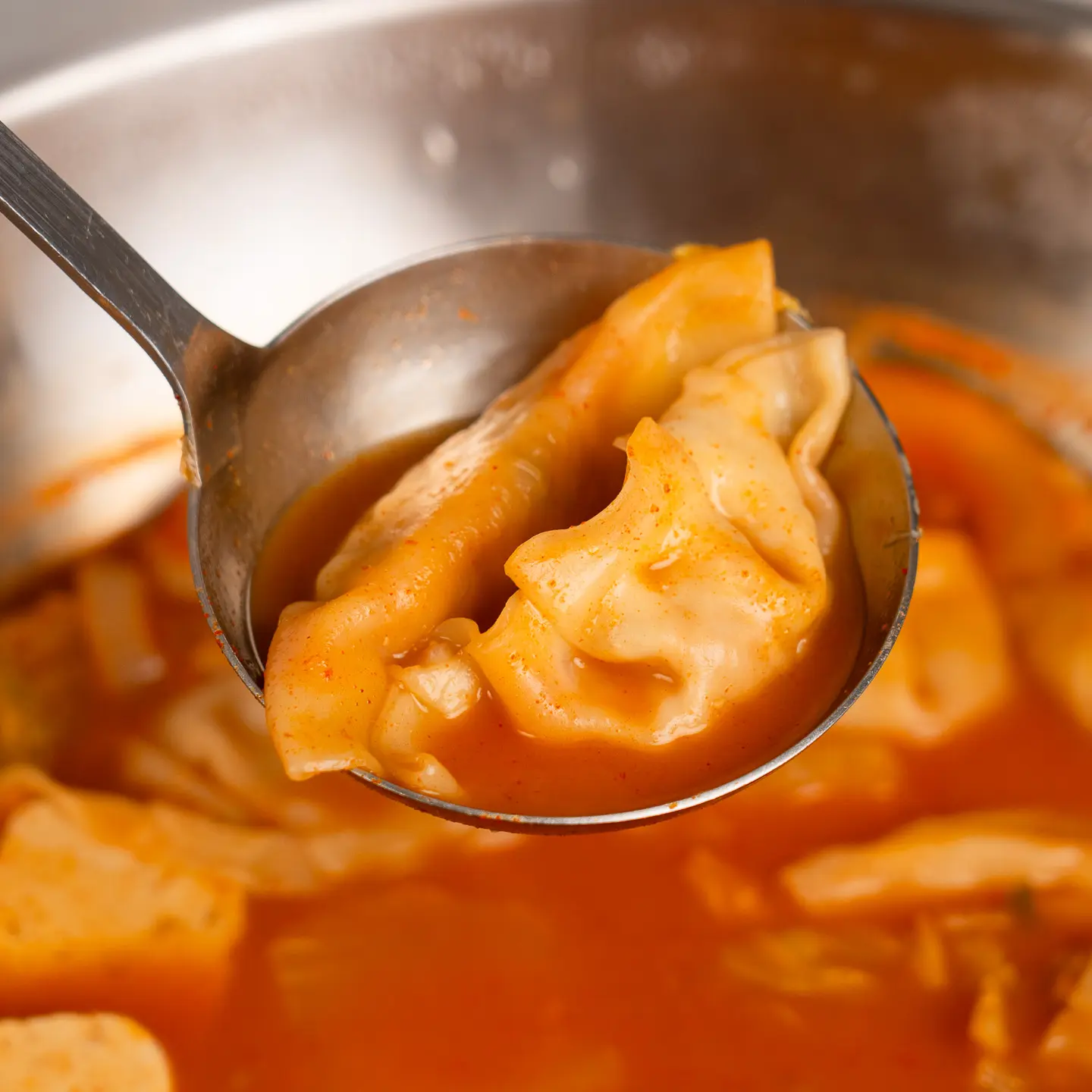
Alcohol Pairing with Hot Pot
In Korea, hot pot is often enjoyed with soju. A sip of soju after a spicy hot pot broth makes for a smooth and satisfying pairing. The refreshing taste of soju complements the richness of hot pot, making it a perfect match!
Get Ingredients Here
- Jeongol Pot: For simmering Jeongol, you’ll need a wide and deep wok. https://amzn.to/3DQgIPu (US), https://amzn.to/4hmr6w3 (DE), https://amzn.to/42f3uVG (NL), https://amzn.to/3RcZnmR (UK)
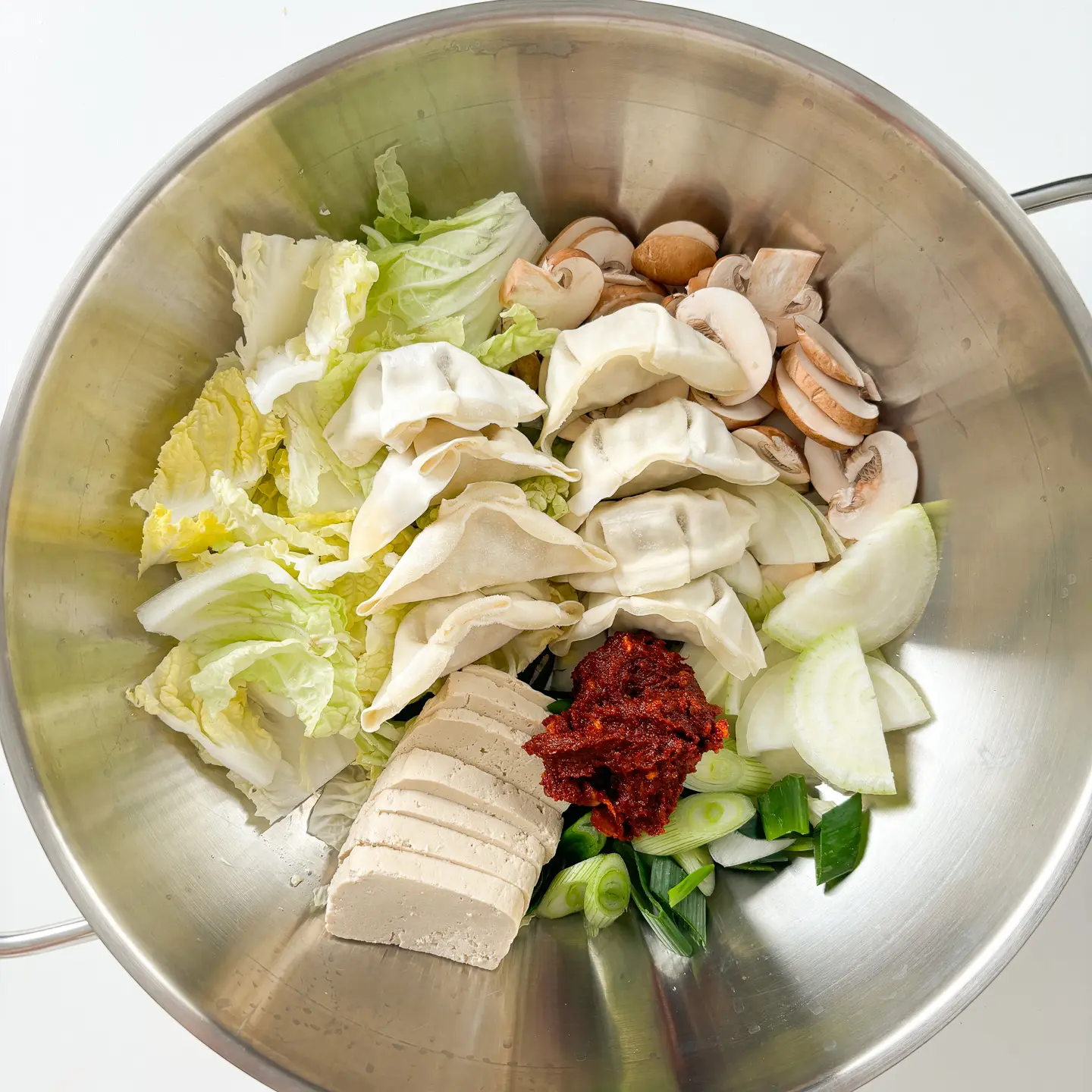
- Bibigo Mandu(dumplings): https://amzn.to/3EcgWAx (US), https://amzn.to/3R9GvFh (DE)
- Guk Ganjang(Soup Soy Sauce): https://amzn.to/40uN7SU (US), https://amzn.to/3Q30hS5 (DE), https://amzn.to/3XQwf8C (UK)
- Doenjang: https://amzn.to/3FYTOWN (US), https://amzn.to/44fa3ca (DE), https://amzn.to/4lh9chf (UK)
- Gochujang: https://amzn.to/3XstNFi (US), https://amzn.to/4hSoh65 (DE), https://amzn.to/4l4b2BU (NL, BE), https://amzn.to/4curibS (UK)
- Gochugaru (Korean Red Pepper Powder): https://amzn.to/4hD0Duw (US), https://amzn.to/40F34pK (DE), https://amzn.to/425ncTO (UK)
- Tuna Fish Sauce: https://amzn.to/42Bxrjn (US)
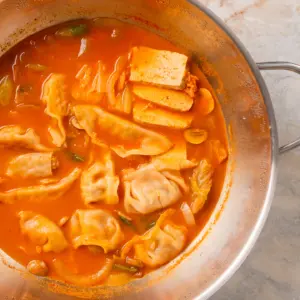
Mandu Jeongol. Spicy Korean Hot Pot with Dumplings
Equipment
- 1 Cutting board & knife
- 2 measuring spoons (1tbsp, 1tsp)
- 1 jeongol pot (shallow hot pot)
- 1 Mixing bowl (for sauce)
Ingredients
- 10 pieces dumplings (Frozen dumplings hold their shape well and don’t fall apart easily, which is why I recommend using them for this dish.)
- 1/4 head napa cabbage
- 100 g tofu
- 1 handful mushrooms (Any type you like)
- 1/2 stalk green onion
Mandu Jeongol Broth
- 500 ml beef bone broth (Sagol broth. Replacements are listed above in the blog post.)
- 250 ml water
Seasoning Sauce
- 1 tbsp gochujang (Korean chili paste)
- 1 tsp doenjang (Korean soybean paste)
- 2 tbsp gochugaru (Korean chili flakes)
- 1 tbsp soup soy sauce (guk ganjang)
- 1 tbsp tuna extract (Substitutes are listed above in the blog post.)
- 1 tbsp minced garlic
Instructions
Prep the ingredients
- Cut the cabbage into 3cm-wide pieces. Diagonally slice the green onion into 1-2cm pieces.
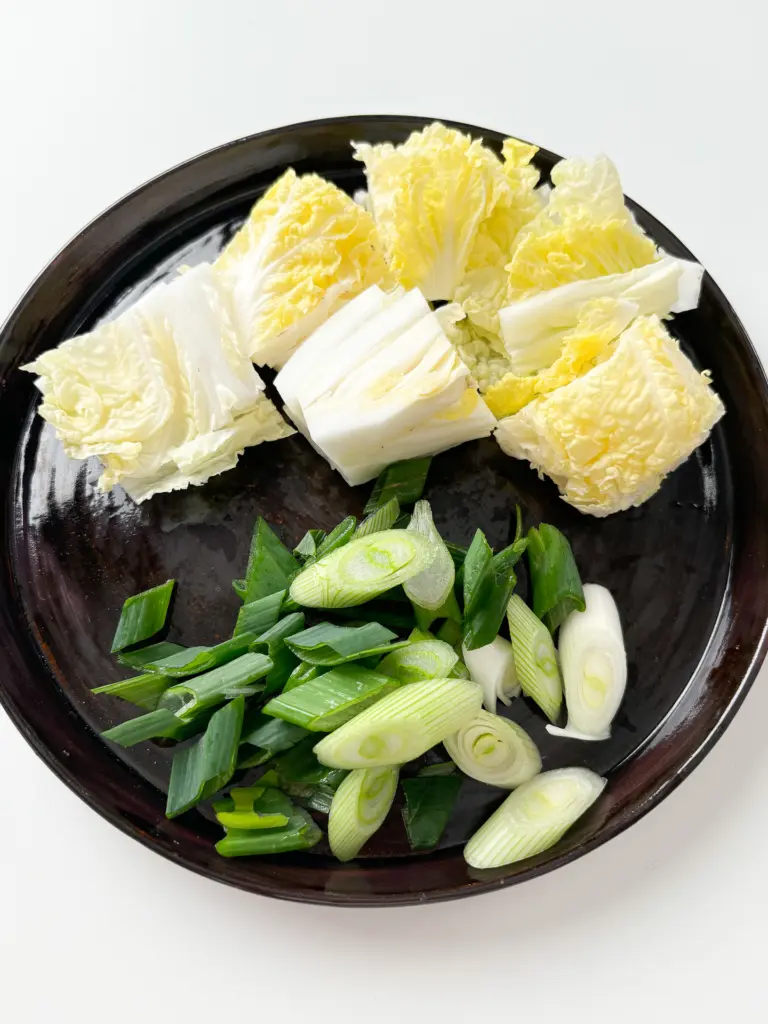
- Slice the mushrooms into 0.2cm-thick slices. Thinly slice the onion.
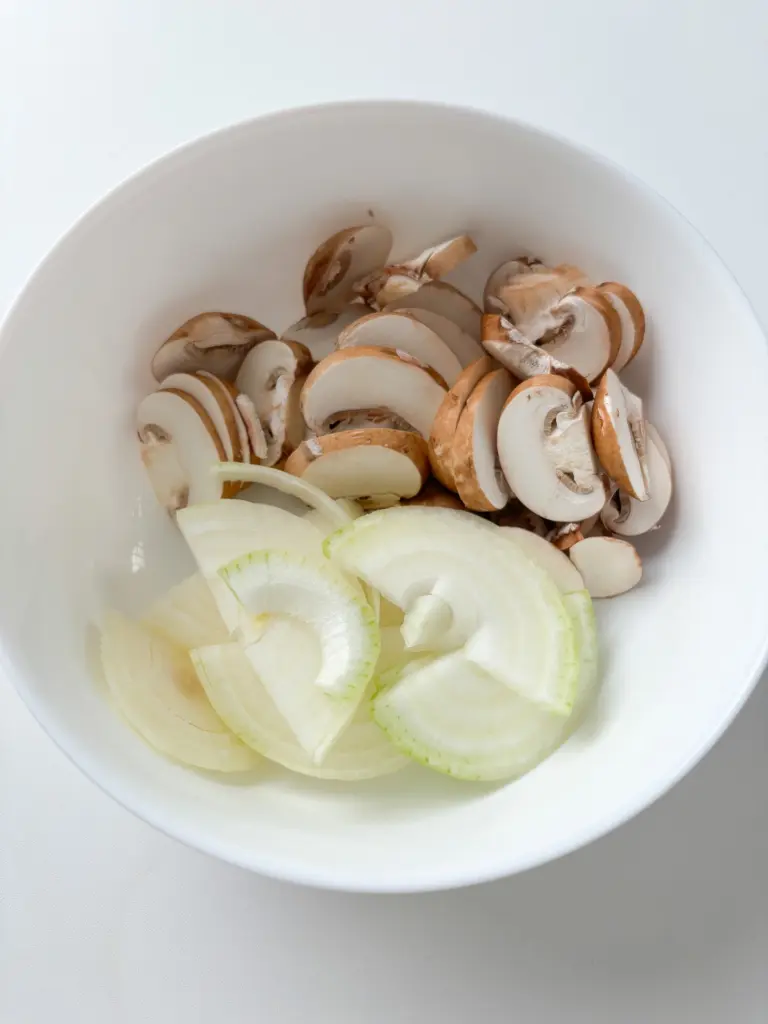
- Slice the tofu into 0.5cm-thick pieces.
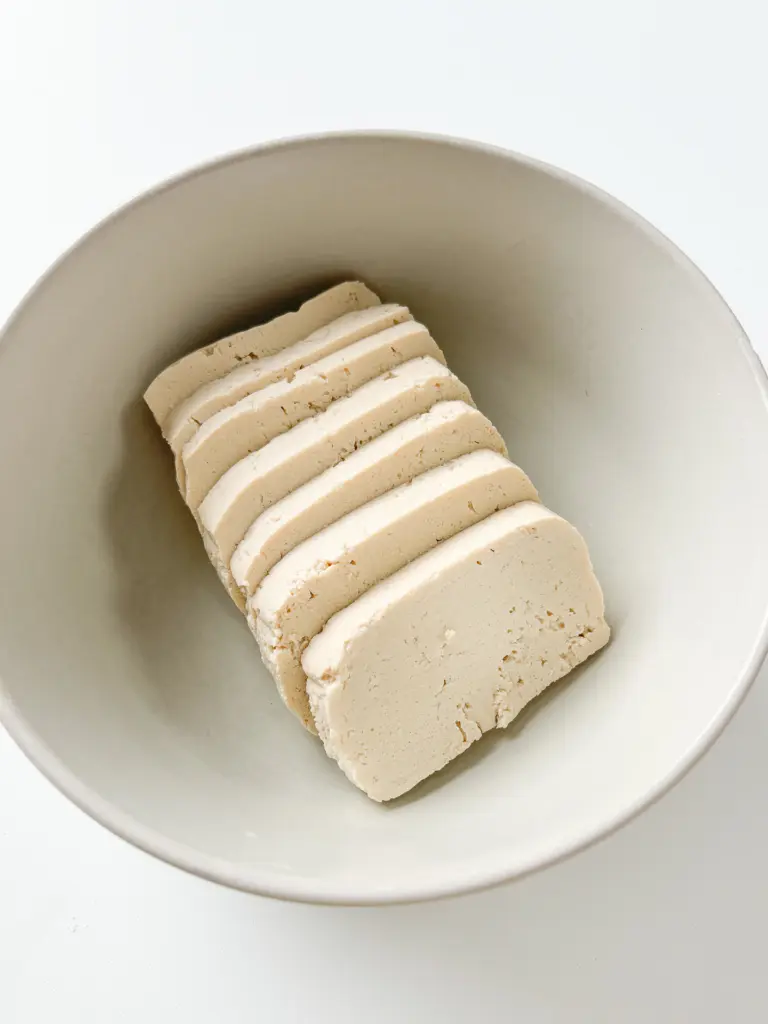
Make the seasoning sauce
- In a bowl, mix together: 1 tbsp gochujang, 1 tsp doenjang, 2 tbsp gochugaru, 1 tbsp soup soy sauce, 1 tbsp tuna extract, 1 tbsp minced garlic.
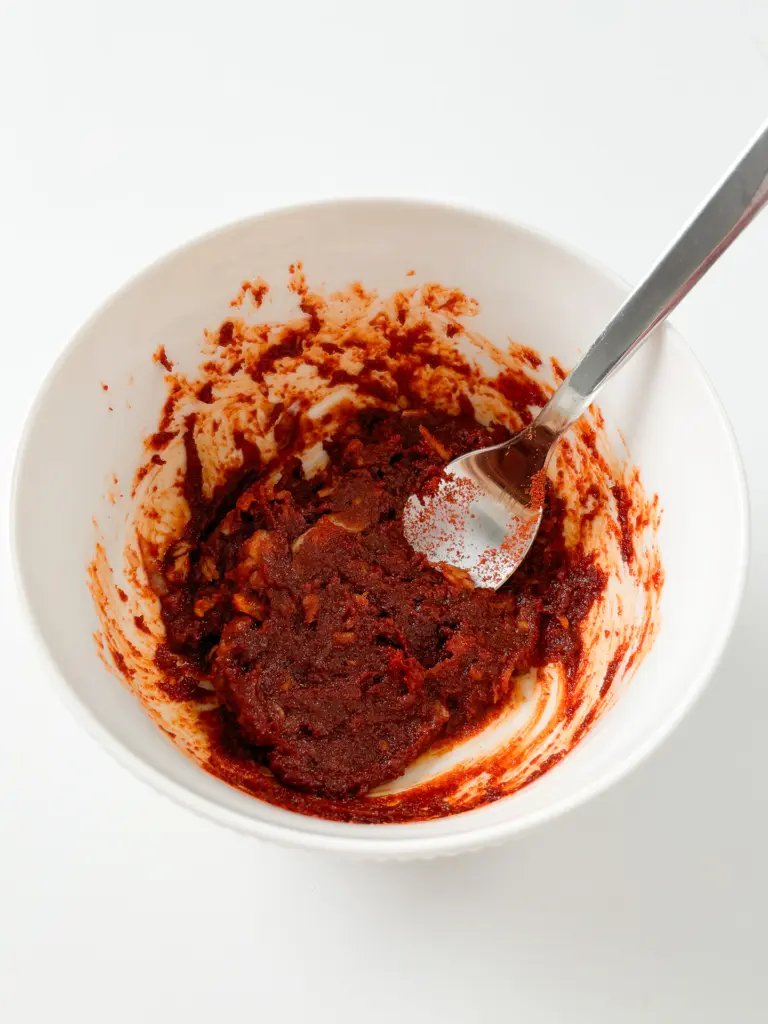
Assemble the hot pot
- In a hot pot (or shallow pot), neatly place the dumplings, tofu, onion, mushrooms, green onion, and cabbage.
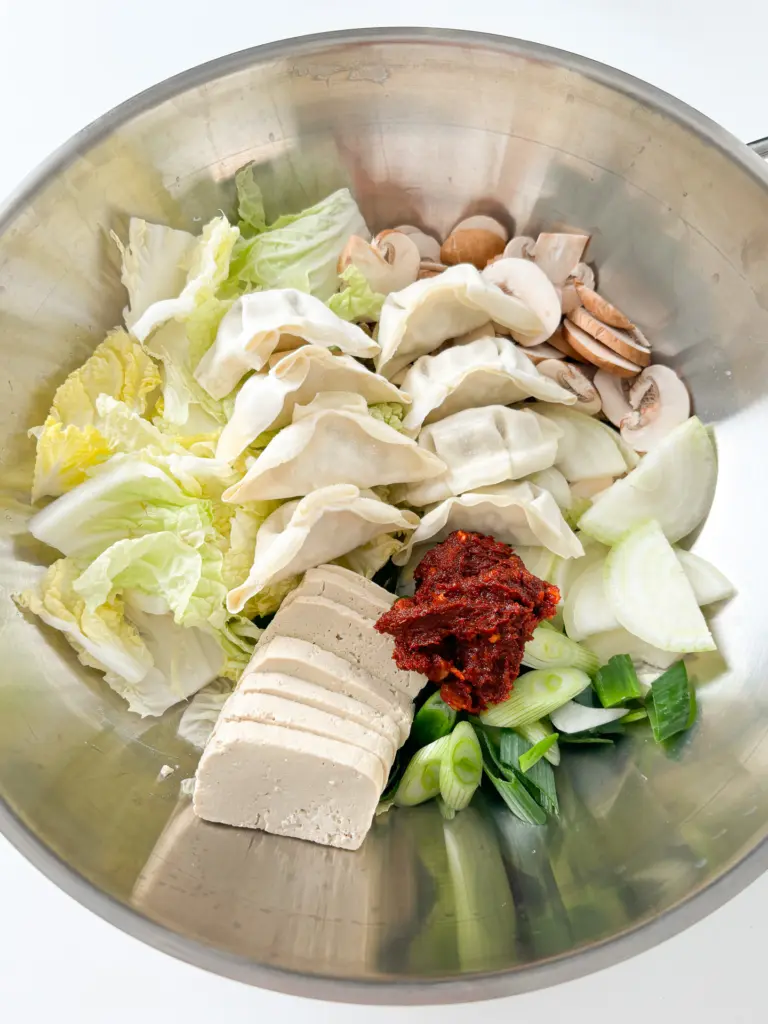
Add broth and cook
- Mix the beef bone broth (500ml) and water (250ml), and pour into the pot.
- Add the seasoning sauce on top.

- Bring it to a boil over high heat and cook just until the dumplings are fully cooked.
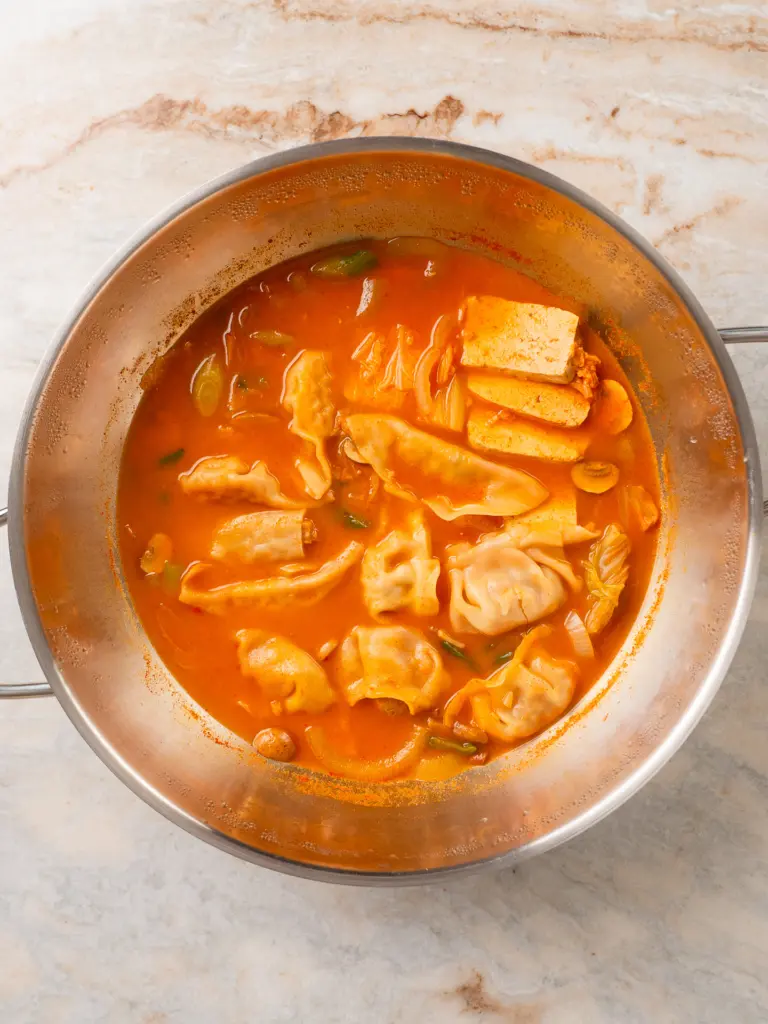
Korean Hot Pot with Dumplings, Mandu Jeongol 만두전골
- Jal meokgetseumnida! 잘 먹겠습니다!
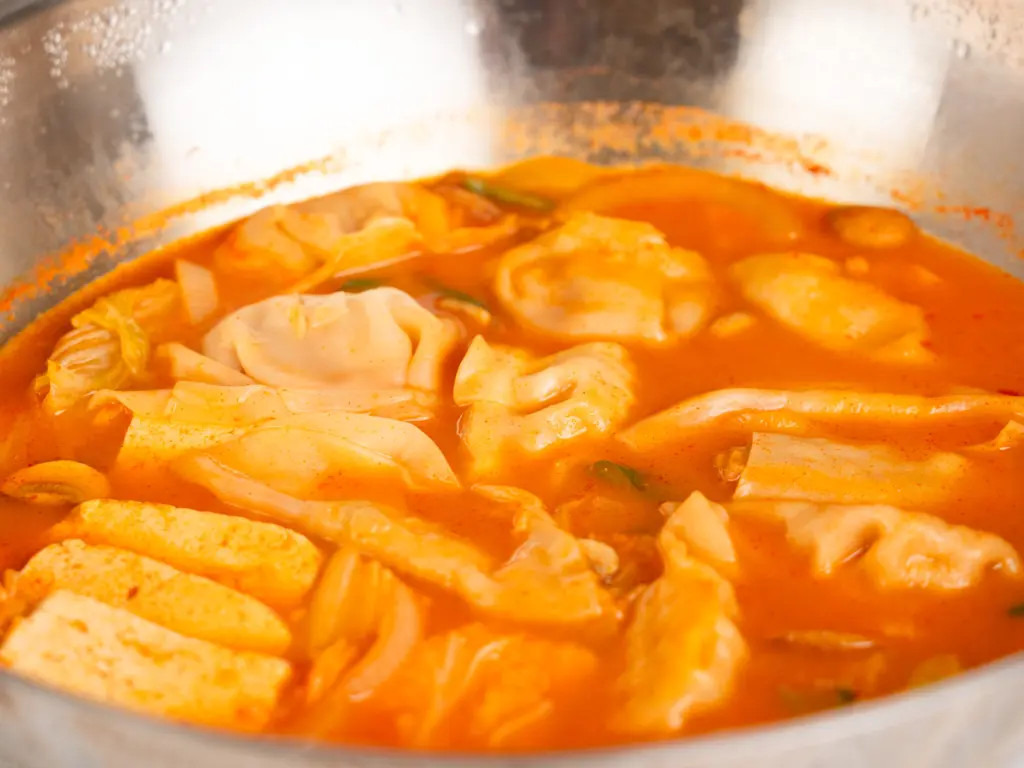
- The spicy broth and dumplings make an unbeatable combo!
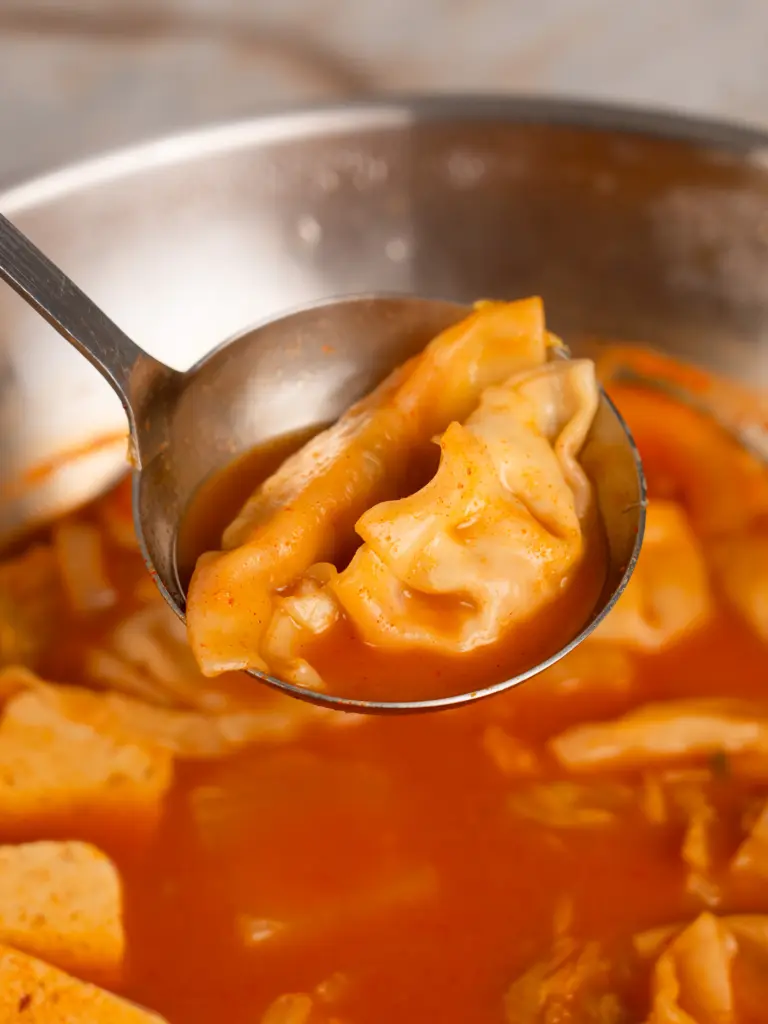
Did you make this recipe?
Please let me know how it turned out for you! Leave a comment below and tag @blondekimchi_ on Instagram and hashtag it #blondekimchi.
